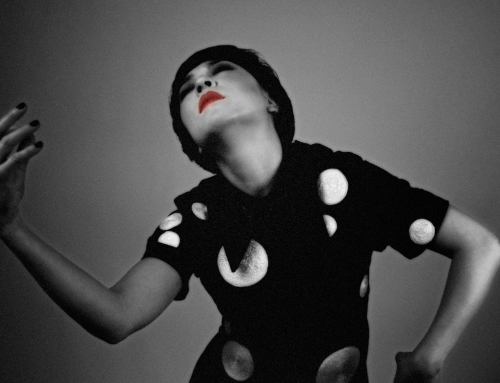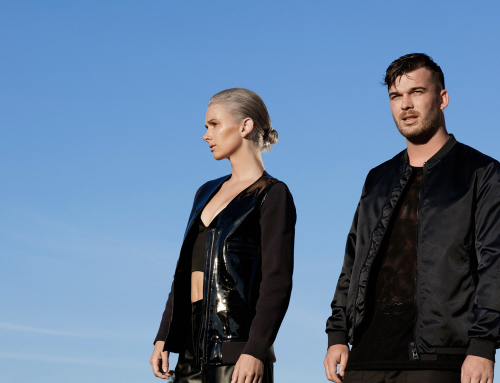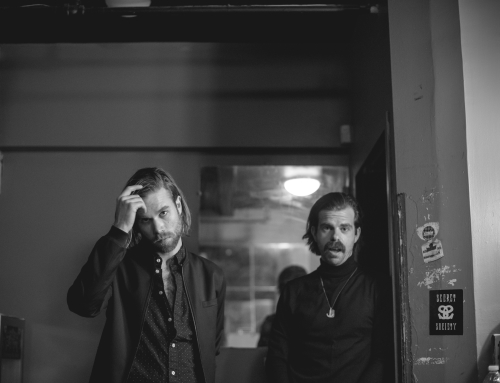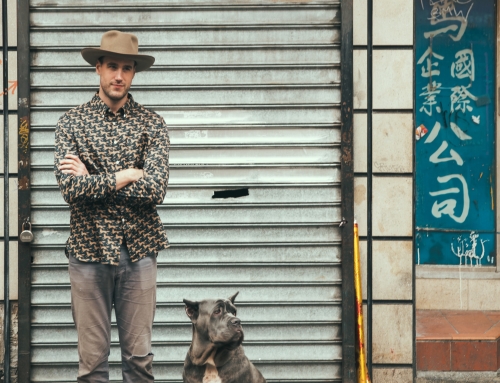Lavender Diamond’s latest release, Incorruptible Heart, wanders whimsically into previously unchartered territory, delving deep into the art of sonic sculpting, while maintaining their classical punk aesthetic. Produced by Ok Go’s Damian Kulash, and mixed by Dave Fridmann, (who is responsible for the luscious psychedelic layering of all but one of the Flaming Lips records), the album’s complexity is a true collaboration, resulting in a collection of gut-wrenchingly visceral tracks.
The trick with this one is — as the group’s enchanting front woman, Becky Stark, shares with us during our interview with her — bringing the album from the recording studio to the stage, which presents a whole separate set of challenges. With its heavily produced tracks, Incorruptible Heart is miles away from the simplistic melodies Lavender Diamond has previously put out. Hundreds of intricately crafted layers meld together, and although the sound is beautifully hypnotic, it’s rather difficult to reproduce live. Stark talks to FILLER about the band’s new sound, and overcoming the hurdles that come with taking their music to the next level.

Let’s talk about your roots in classical music: does that play into the current album’s sound at all?
There is actually…I guess I haven’t been thinking about that, but in my collaboration with Steve — our keyboardist — I guess that’s how we first started playing together because I had written an operetta, and I wanted to stage it, and Steve had written an opera, and I saw it, and thought it was so beautiful, and so we got together, and started to play together that way. I just found that playing with Steve was such an amazing experience. It felt so totally free in being able to create music, and sing in a style that was really influenced by my experience in singing classical music.
What’s the classical “experience” like as a singer?
The way that you sing classical music, there is a range of sound that I guess is broader…well not broader because in pop music there is also a lot of range, but I guess the way that the voice can be used in classical singing is so expressive. It feels so amazing to be able to express that range of emotion. You can definitely hear that sound as far as my collaboration in writing and performing the Lavender Diamond sound, and finding Steve and the music, we can express freely from that place.
And the writing process, what’s the inspiration behind the latest record?
A lot of the songs I had written by myself for a couple of years. I was trying to make this record with all of these really sad songs called Agony Agony Agony. They were really sad songs, [and] I wanted to make it alone in kind of the most desolate way, but it didn’t lift off. Then I started playing with Steve and Ron again, and I guess I just feel so free when I play with them. I feel like I can express things musically that by myself, I don’t have that dimension.
Sounds like an organic creative process.
There are four songs on the record that Steve and I really spontaneously created together, [including] a really operatic song “All the Stars,” ‘Light my Way,” and “I Don’t Recall,” and “Everybody’s Heart is Breaking Now.” We actually got together, and wrote those songs, except for “All the Stars,” which we had written a couple of years ago, we just got together, and those songs just happened in one night really. And a lot of the other songs on the record I had been playing by myself, but then when I brought them to Steve and Ron, they just took on a different level of life — they came to life. I’ll come with a melody and cord for something that is very simple, and then they will contribute something that I have never thought of that is very magical.
What about your producer, Damian Kulash’s role, he seems to have brought another dimension to the record as well.
[He] really contributed a lot to this record because everyone wanted to make two records, one of the songs I was working on on my own, and one with the band, but then Damien said: ‘why don’t you just make one record and really just make it all one thing.’ And then Damien contributed so much to shaping the songs, and making them exist in a different landscape — in a sonic, electronic landscape we as a band had never explored, and I had never explored either.
So it was quite a change for you all then?
It was a lot of evolution that took place, which is really funny because we really made the record with no regard to how it [would be] played live. We were just making it, and we made it with Damien, who layered hundreds of electronic layers, and then we took it to be Fridmann in upstate New York. And Dave Fridmann makes all of the MGMT records. He’s a crazy amazing psychedelic sonic master, so I had these melodies in mind, and [I had written] all the lyrics and the melodies, but I knew I really wanted it to go to another dimension that I really couldn’t accomplish. We went to Dave, and Damian asked me to trust him, and he said: ‘let’s make this record and bring it to Dave Fridmann, and just trust me, it’s going to be amazing.”
Sounds like you really had to place your trust in Dave.
I was going through the process with a lot of faith. The first song we mixed was “Everybody’s Heart is Breaking Now,” and he came, and was like, so can we make this sound like “Total Eclipse of the Heart,” like Bonnie Tyler, and I said, ‘yes, perfect…exactly.’ I didn’t really know how to do that myself, and neither did the band. We have generally been pretty punk about our aesthetic, so figuring out how to make those sounds happen is kind of incredible. We have been working with Nate Wilcott [of Bright Eyes], who is trying to unpack some of the sounds of the record, and he’s like, ‘I cant figure this out, how did you make this!’
The tracks on this album have a very natural build up; was that a creative decision on your part?
After we had made it, we were like, ‘how is this going to flow as one piece because the sounds are so different?’ We just kept playing around with the order, and it just seemed to fit that way; it was kind of like a puzzle. I think it flows, I think it builds. Steve thought that “Just Passing By” was too small to be at the beginning of the record, but I don’t know, it just seemed to make sense…or I hope it does. There are so many different tones on the record that it is pretty varied and pretty wild. We were just really running with it, and really in the thrill of making it.
The experience was a good one then overall?
The experience of making the record was just incredible. It was totally thrilling, and I have never had a creative experience like that that felt so thrilling, and it felt like we were all working together to get to the truth of the songs. So then afterwards, it’s like, ‘what have we made? Oh my God, maybe this is crazy or terrible, what have we done? And how are we going to play it live.’ But I really love the record as an object — as an artifact. How we play it live is now evolving.
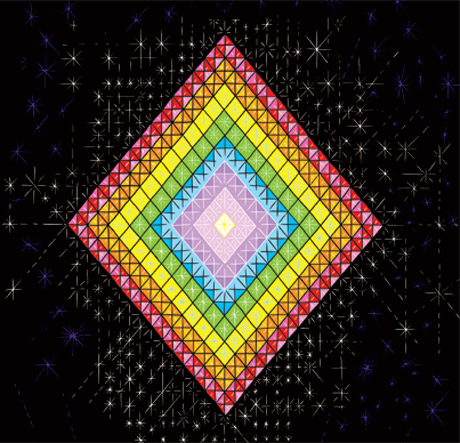
So how have you guys been dealing with overcoming the challenge of playing the record live?
With a lot of good humor (laughing). Sometimes I have to ask for help because I am like, ‘of course we can play it live,’ but the truth is it sometimes becomes a comedy. Sometimes we have to ask for help because we are not an electronic band.
It’s cool that you are so open to taking on new frontiers with your sound, and asking for help to do it.
I knew that it had to go there, and it’s funny because Steve and Ron and Jeff were resistant because they were like, ‘we can just play it how we have always played,’ but I was like, ‘No! We have to evolve, we have to grow.’ So we started playing around with the keyboards, and we started asking people like, ‘if we are going to have delay on the drums, does that mean we are going to get a delay pedal.’ It was pretty hilarious, but then Nate offered to help us because he had done that stuff with Broken Bells and with Bright Eyes but then, he started looking at it, and was like “I don’t know how you are going to play this live.”
And where are you now with the live show?
It’s a work in progress. We did a show last week and it was the first time that we played with a more electronic sound, and I think it was amazing. Actually, it was my favourite Lavender Diamond concert ever. And parts of it sounded crazy. We are all really excited to just be in the thickness of it. And we are all really fortunate that we have a really supportive community of musicians. Anyway, it helps me to have a perspective about it that’s funny, which is, well: we are going to get to it somehow.
Sounds like you still have some hurdles to overcome, but you’re getting rewarded for the risks you took. The album says it all.
There is the most vitality in something if you are willing to let it grow. I have been feeling some measure of regret in the last couple weeks like, ‘why did we do this,’ but I am glad we did, and I’m glad we let ourselves go wild with it. I mean, it’s risky, but I think when you do that, it becomes possible to have something grow in a way that you couldn’t consciously create if you are working in a way that you aren’t totally willing to let it change. That was a condition of working with Damien. He said, ‘you know if we are going to work together, we are going to keep the core of the song, but we will let them grow in ways that you may not have thought.’ And for some reason, it just seemed like the right thing for them to do for it to come alive.
Writer Amy Weinstein is co-founder of www.syncopatedsound.com. A fun-loving music fan herself, Syncopated Sound is dedicated to sharing the latest in upcoming shows and album releases, as well as featuring original interviews and editorials from a distinct perspective.







